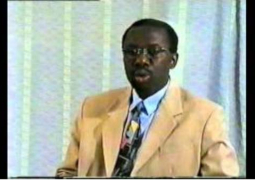Teachers of Central and Upper River Regions recently concluded a three-day capacity building training on conflict prevention organised by WANEP.
Peace education is one of the various ways WANEP-Gambia seeks to ensure livelihoods in The Gambia and maintain under peace and stability teachings, according to Iris Cassel, education officer, Life Skills Education unit of the Ministry of Basic and Secondary Education.
She urged the participants to relay what was learnt to the rightful people, thus challenging them to be ambassadors of peace in their respective schools.
“This training is timely as children should be taught on how to nurture peace and be able to know how to manage conflict,” she said.
The forum, which focused on thematic areas, such as peace and peer mediation, also discussed the principles/practices of mediation, anger management, building self-esteem, joint problem solving roles play on mediation, accommodation, and other subject matter.
Francis Mendy, acting national coordinator of WANEP-Gambia, gave a brief history of the existence of WANEP, while highlighting the objectives of the Peace Education Programme and a rundown of the training module for the three-day.
“Your presence is to take part in building the necessary capacity at national level to be able to replicate the training when you get back to your different schools in your different regions in the country, so as to contribute to building peace not only in our schools but by extension in our communities,” Mendy told participants.
“We appreciate the partnership and wish to assure you (the Ministry) that we will continue to work with you in the quest to provide not only education to every Gambian, but to orient our young people towards a culture of peace, which is necessary for the development to take place in our country,” he assured.
Mariama Jammeh, WANEP project assistant, said: “Our peace education programmes are centred on conflict training individuals on the need to resolve inter-personal disputes, through techniques of mediation and negotiation. Peace we said must begin in the minds and hearts of children and the challenge is to ensure that children receive quality education that would build peace.”
Ms Anna Jone, programme officer, WANEP-Gambia, observed as a growing concern the exposure of children and young people to conflicts in the region, thus the synergy aimed at promoting culture of non-violence and social responsibility among young people, most particularly students, to minimize the involvement of youth in violent conflicts; thus increase the use of non-violent strategies in conflict resolution among the youth-folk.
Madam Jone further stated that it was in recognition of this impact that the West Africa Network for Peace Building (WANEP) designed and implemented a West Africa specific peace education programme since 2003, as its contribution to addressing the rising level of young people and children’s involvement in violent conflicts in West Africa.
According to her, the acceptability and the impact of the project had motivated WANEP to capture its experiences through a practice guide that would become a referral document to institutionalise peace education policy and practice in West Africa.
To her, the pedagogical approach of Peace Education in school aims to promote the culture of peaceful co-existence and preventing the incidence of conflict situation.



